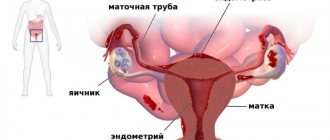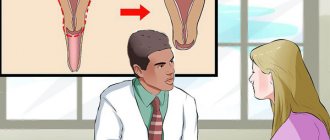Absence of menstruation due to pregnancy in a woman
Why did my periods suddenly disappear? The most common reason for not having menstruation on time is pregnancy. The menstrual cycle consists of three phases: follicular, ovulatory and luteal. If during ovulation the egg is fertilized and then successfully attaches to the uterine cavity and develops, a large-scale restructuring occurs in the female body. The corpus luteum provides the embryo with everything it needs, and then (by week 15-16) the placenta takes on this role. Menstruation does not come because the endometrium of the uterus is not shed.
Other symptoms that can help determine pregnancy include breast tenderness, breast swelling, mood swings, metallic taste in the mouth, weakness and drowsiness, cold symptoms, nausea and vomiting (early toxicosis), dizziness, sensitivity to odors and cravings for certain foods. . In the early stages, spotting and spotting may appear, which lasts no more than two days. Usually women take this as the beginning of menstruation, but the discharge ends abruptly, and the next month the period does not come again.
Pregnancy can be confirmed if menstruation is late using a home test that detects the presence of hCG in the urine. You can go to the hospital and use a blood test to see whether the hCG is increasing over time. If the level of hormone concentration increases rapidly, then pregnancy develops. In the first weeks, the gynecologist can sometimes confirm the patient’s interesting position during a manual examination or refer the woman to an ultrasound scan, which is performed transvaginally in the early stages.
https://youtu.be/92RoFZ3Y1zA
How to get your period back after losing weight?
The absence of menstruation in women over the age of 45 is considered normal, since this occurs as a result of menopause. But if you are 18-45 years old and have a similar problem, then you should immediately consult a doctor. Do not restore your period on your own. This should be done by a specialist, since treatment often requires taking hormonal medications.
So, there are a few steps to getting your periods back.
Step 1. Visit a gynecologist. The doctor must conduct a thorough examination and accurately determine the cause of the absence of menstruation. Diet is not the only cause of this problem. The reason may also be:
- stress;
- disease of internal organs;
- heavy physical activity;
- menopause;
- disruptions in the body's metabolic processes, etc.
The gynecologist will prescribe you a course of necessary medications and monitor your health until complete recovery.
Don't be afraid to take hormonal medications. Some modern drugs do not cause weight gain. Even if you gain a few extra pounds, you can lose them with the help of a balanced diet and exercise within a month. In any case, women's health is more important than a slim figure.
Even more interesting:
Tongue with HIV infection photo
Yarina or Dimia
Step 2. Balanced nutrition. In order to get your period back after a diet, you need to adjust your diet. It should be varied and balanced. Keep a food diary. This will help you monitor your diet more carefully and correct dietary mistakes. Write down everything you eat during the day, count calories and nutrients:
- Calories. The norm is 2200 kcal per day. But this figure depends on your physique and lifestyle. If you play sports or do heavy physical labor, then you need to eat about 2500 kcal. If you lead a predominantly sedentary lifestyle, then 1800-2000 kcal will be quite enough.
- Squirrels. The recommended protein intake is 1.5 g of protein per 1 kg of weight. For example, if a girl weighs 60 kg and leads an active lifestyle, then the norm for her would be 80-90 g of protein per day. Proteins are found in foods such as chicken, fish, eggs, dairy products, legumes, and buckwheat.
- Fats. They are the main nutritional element that regulates the functioning of the ovaries and pelvic organs. The norm is 1.5 g per 1 kg of weight. A girl who weighs 60 kg needs to consume 90 g of fat per day. The ideal option would be if 60 g are in animal fats (fish, beef, chicken, fish, egg yolks) and 30 g in vegetable fats (seeds, olive and other vegetable oils, nuts).
- Carbohydrates. There should be 4 g of carbohydrates per 1 kg of weight: for 60 kg of weight, 240 g of carbohydrates per day is enough. Do not abuse fast carbohydrates: cakes, pastries, white bread, sweets. They should not exceed 10% of your daily diet. Lean on slow carbohydrates that will give you energy for the whole day: cereals, durum pasta, rye bread, etc.
- Vitamins. Don't forget about vegetables and fruits. They should make up 30% of the daily diet. Forget about unhealthy snacks on the go and grab an apple or banana with you. Vegetables and fruits also contain fiber, which has a beneficial effect on the digestion process.
Step 3. Traditional medicine methods. Another remedy for restoring menstruation after a diet is folk recipes. But it is impossible to give a 100% guarantee of the effectiveness of these methods. You can turn to them if you are afraid to go to the doctor or traditional treatment does not help you. Recipes:
- Pour boiling water over 1 tablespoon of oregano herb and leave for 40 minutes. The infusion should be taken one glass 3 times a day.
- Drink lemon balm tea 2 times a day.
- Pour 1 tablespoon of mint, valerian and chamomile into 600 ml of boiling water and leave. Drink 100 ml before each meal (3-4 times a day).
- An excellent remedy for restoring the menstrual cycle is parsley. You can brew an infusion, and also eat it fresh.
Pathological amenorrhea: in what cases is the absence of menstruation a pathology?
Why did my periods disappear? The causes of amenorrhea can be different. The absence of menstruation and other signs of puberty in adolescents under fourteen years of age is considered pathological. Pathology is also indicated by the absence of critical days in the presence of other signs of maturation before the age of sixteen. Why do teenagers miss their periods? In teenage girls, the norm is the absence of menstruation from two to twelve months after menarche - the first critical days. This occurs due to large-scale hormonal changes in the body. In adult women, pathological amenorrhea is the absence of menstruation for three cycles in a row, provided that previously the critical days were normal.
Missing periods after losing weight - what to do
When there is a problem with menstruation after long-term weight loss, you need to reconsider your diet, for example:
- Meats include beef and lean pork.
- In order not to overload the body, you should include only one new product daily.
- You can restore vitamin deficiency after losing weight with the help of vitamin complexes, which can be bought at any pharmacy.
- Drinking also plays an important role in restoring menstruation: it is important to drink at least two liters of water per day.
What is amenorrhea
Amenorrhea is the cessation of menstruation for two or more cycles. The reasons may lie in genetic abnormalities, psychosomatic problems, or peculiarities of biochemical processes. Temporary cessation of menstruation in girls can be not only due to an incorrectly chosen diet when losing weight, but also due to stress, emotional state, nervousness - all this affects menstruation. The whole body suffers, nails may peel, hair may fall out, and skin may fade.
The next reason for the absence of menstruation may lie in injury to the lining of the uterus, as well as tumors, congenital anomalies of the female reproductive organs. Irregular periods can also be caused by anorexia; this occurs in girls under the age of 17, and in women under 45 years of age. The reason may be grueling training, daily stress in the gym. How to get your period back after losing weight? It is important not to put off the problem, consult a gynecologist, and based on the tests, he will prescribe individual treatment.
Reasons for lack of menstruation
The reason for the absence of menstruation can be either obesity or anorexia. In both the first and second cases, hormonal disruption occurs, metabolic processes are disrupted, and amenorrhea occurs. Fat cells help androgens convert into female sex hormones. Due to the presence of excess weight in such women, the level of male sex hormones is 3 times higher than normal, which can lead not only to hirsutism, but also to infertility. If you do not consult a nutritionist, you can harm your health: excess weight aggravates the problem of hormonal balance of estradiol and estrogen.
Menstruation irregularities are also observed with severe weight loss: a lack of fat cells is formed. This leads to the fact that it is difficult for a woman to become pregnant, anovulation and amenorrhea occur. A critical amount of adipose tissue affects the mechanism of puberty in girls. It is important to stick to a weight that is optimal for a given height. In such women, there is a constant change in estrogen levels depending on the cycles, and in obese women this hormone is always off the charts.
The main reasons for the cessation of menstruation: primary and secondary amenorrhea
Why can periods disappear? In addition to pregnancy, there are many reasons that can cause amenorrhea. In this case, a distinction is made between primary and secondary pathology. Primary amenorrhea is the complete absence of menstruation in a teenage girl, secondary amenorrhea is the absence of menstruation in an adult woman for three cycles, if previously menstruation was normal. The causes of primary amenorrhea may be obstruction of the vaginal opening, cervical canal, uterine cavity, vagina, congenital adrenal hyperplasia, hormonal disorders.
Why do menstruation disappear (except during pregnancy) if we are talking about secondary amenorrhea? In this case, the absence of menstruation can be provoked by psychogenic factors (stress or other strong emotional experiences and shocks), cessation of oral contraceptives, sudden weight loss, insufficient weight or severe dietary restrictions, various types of diseases of the reproductive system, including cancer, diseases thyroid gland, some endocrinopathies (hypo- or hyperthyroidism, diabetes), taking certain medications.
Amenorrhea: where is my period?
I didn’t go to the pool on MONDAY. I put on red panties, climbed into a chair with my legs, read and waited for my period. They were supposed to start on Sunday - as accurate as an expensive Swiss watch. Were. Because neither Sunday, nor Monday, nor even Tuesday started. Everything around is annoying. The beloved looks with longing: “Why are you in such a bad mood? Aaaaah, you have PMS!” Oh, if only. If only I could feel this aching heaviness in the lower abdomen! Yes, I agree one hundred percent PMS! Wednesday morning did not bring any news to our lives. I had to give up the pool again: suddenly... But “suddenly” didn’t happen again. I looked at the calendar ten times a day, counted the days again, even using a calculator, but I couldn’t find any errors: day X still turned out to be the same Sunday. Every fifteen minutes I run to the toilet to check. All to no avail. What could it be? Amenorrhea? Pregnancy? Climax?
Version 1 is also the most common. Any girl who has a head for more than just eating knows where babies come from. The first thing to do if you don't find your period in the right place at the right time is to head straight to the nearest pharmacy and buy a pregnancy test. After the second day of delay, he will refute or confirm your doubts with 99% accuracy. If the delay period is short, it is important to use only fresh morning urine and look at the result no sooner than after 1–2 minutes, when the entire space of the indicator becomes wet. If the second line appears unclearly, the result is still considered in favor of pregnancy. If it is not there, and suspicions still remain, a new test should be performed in 2-3 days.
I don’t think it’s worth talking about visiting a gynecologist. Even if the test constantly gives a negative result, and menstruation never begins (amenorrhea is a cycle disorder), you need to contact this doctor. Of all the reasons for the absence of menstruation described below, the doctor will choose yours, order you to take the necessary tests, do an ultrasound, and prescribe treatment that is suitable specifically for your case. No newspaper article can replace a doctor and a real examination. In each case there are a lot of nuances and deviations. So we don’t accept what is written here as a panacea for everything in the world, but get acquainted, stop worrying, think that this is your case, wait a little more and go to the doctor.
Version 2 is also, in general, well-known. You have two adult children who are going to make you happy with grandchildren any day now, a lot of romantic adventures in the past and a wealth of life experience behind you. You even know that the production of eggs in women stops after 50 years. So, there is nothing wrong with the word “menopause”. Now you know it firsthand. Everyone experiences it differently. Your friend may suffer from bouts of apathy, migraines, or suffer from hot flashes, while you will be traversing the neighborhood on a bicycle and enjoying life. It may be the other way around. Be that as it may, the absence of menstruation in this case is quite natural.
Doctors call the absence of menstruation for no apparent reason at first glance in a non-pregnant woman of childbearing age amenorrhea. In fact, there can be several reasons for amenorrhea.
Infectious and somatic diseases , such as heart defects, liver disease, tuberculosis, radiculitis.
Intoxication is poisoning of the body with large amounts of alcohol, some drugs, as well as mercury and lead.
Any uterine pathologies - in this case, only a doctor can prescribe an accurate diagnosis and, even more so, treatment for you after a full examination. It should be noted that endometritis - inflammation of the uterine mucosa - causes cycle disruption.
Hormonal disorders - any disturbances in the functioning of the pituitary gland, ovaries, adrenal glands, or thyroid gland. In this case, you will need to consult a gynecologist-endocrinologist.
Neuropsychic disorders. Any disorders of the autonomic nervous system can cause disruption in the body’s functioning, so in this case you should immediately consult a doctor.
In addition to the amenorrhea described above, the same diagnosis can be made with the prefix “false”. This means that the ovaries are functioning normally, there are cyclic changes, but blood is not discharged out due to some kind of obstruction. Most often, this occurs in girls who do not seem to have menstruation. If the hole in the hymen is too small, then menstrual blood simply cannot escape. Adult women may encounter some obstructions in the cervix or vagina, but in practice this rarely occurs.
A strict diet, an exhausting regimen, very low weight, exhaustion and dystrophy - all this can affect the cycle and provoke its disruption. In this case, the main thing is not to continue torturing yourself, but to let your body eat normally. If you have a very busy daily routine, take vitamins and be sure to rest, even if you avoid doing something necessary: health is more valuable. If even after gaining weight, menstruation does not return, it means that you have completely confused your body and you need to go to the gynecologist. And then, perhaps, to an endocrinologist.
Moving to another city or even country, a quarrel with a loved one, conflicts with children, being stuck at work, a difficult session, experiencing a shock, seeing a tragedy by chance - all this leads to stress. And stress gets on your nerves. And according to the menstrual cycle. This is the very case when the doctor is unlikely to be able to do anything. Most likely, you will be advised to drink ascorbic acid and wait for the results. Ascorbic acid should be taken one tablet twice a day for 7-10 days. Then wait a couple of days for your period. If they are still not there, then the matter is more serious. Again, you need to visit the gynecologist's office.
Ovarian dysfunction is a disruption of their functioning. If you have not been diagnosed with any disease, and enough time has passed to recover from stress, most likely you will be given just such a diagnosis. Dysfunction in general can be provoked by a huge number of factors.
Most likely, hormone therapy will be required. Very often (if the disease was stopped at the very beginning), doctors prescribe birth control pills for therapeutic purposes.
For correct diagnosis and treatment, you need a blood test for hormones and an ultrasound examination.
Sexually transmitted diseases can cause menstrual irregularities if the inflammatory process reaches the uterus. So, for example, with trichomoniasis and chlamydia, if you do not consult a doctor in time, after a burning sensation in the vagina and the appearance of corrosive leucorrhoea, the infection will spread to the cervix, and then further, the result is acute inflammation of the uterus. At this stage, problems with the cycle already arise. However, if you suddenly suspect you have an STD and immediately go to a venereologist and complete the full course of treatment, there should be no cycle disruptions.
If you use a method of protection such as postcoital contraception, that is, you take medications (Postinor is widely known in Russia) after sexual intercourse, then it is important to keep in mind that their effect can also “delay” your periods. In addition, you need to know that “fire” contraception is allowed no more than 2 times a month, because the dose of hormones in these pills is too high - and it is not yet known how the body will react to this. Although it is more common to experience bleeding after taking post-coital pills, delay is also possible.
In any case, the absence of menstruation is not a situation where you should rely on your own strength and hide from gynecologists.
Risk factors for developing amenorrhea: why menstruation may disappear
The likelihood of amenorrhea increases if there are precipitating factors in your life history. Why did my periods disappear? Amenorrhea can be provoked by physical overload, eating disorders and psycho-emotional stress. Why do my periods disappear when I diet? The same reasons cause amenorrhea during physical activity. A large load for an unprepared body is real stress, so your period may not come on time if you start actively training. Thus, if menstruation disappears after physical activity, then it is necessary to reduce its intensity, and not completely abandon sports.
Metabolic disorders, weakened immunity, disruptions in the reproductive system and gastrointestinal diseases can be caused by a lack of proper nutrition. This is a fairly common situation. Why do my periods disappear when I lose weight? This indicates a colossal lack of nutrients. The production of hormones is disrupted, causing serious harm to women's health. As a result, you may encounter not only a lack of menstruation, but also the formation of a cyst or even infertility.
Another risk factor is stress, changing climate zones or taking certain medications. Why do my periods disappear in the summer? This occurs due to the sharply increased air temperature. The body does not immediately accept such a restructuring; it perceives it as stress. In women, acclimatization can occur precisely in the form of a delay. As for stress, this is a very strong factor that can provoke the absence of critical days for an indefinite period. There is information that during the war, women did not have periods for several years.
Reasons for the failure of menstruation
Typically, a woman should reach menopause between the ages of 45 and 55. If menopause occurs at a younger age, this indicates disorders occurring in the woman’s body.
If over a long period the body does not receive enough necessary elements, this can ultimately lead to the development of anemia, disruptions in the production of genital organs, and changes in metabolism, which leads to ovarian dysfunction. During the initial period, when menstruation is absent, this process can still be reversed. However, further these processes lead to irreversible changes occurring in the woman’s reproductive system.
Experts believe that over a long period of time it can cause serious disturbances in the hormonal balance, which can lead to the development of pathologies such as non-functional bleeding of the uterus, benign formations, as well as polycystic disease and cysts in the ovaries, which will ultimately lead to infertility.
The menstrual cycle may be disrupted, and periods may disappear if the diet was really strict. A deficiency of animal products, including fats, contributes to hormonal imbalance. Due to a lack of cholesterol, the body begins to produce less female hormones. Due to the lack of the latter, dysfunction of the hypothalamus, pituitary gland, and ovaries occurs. This leads to progesterone deficiency. The process of development of the endometrium slows down, as a result of which the process of its detachment is somewhat delayed. Menstruation after the diet for the first month, then the second month begins to appear with some delay, and then is absent altogether. A symptom that diet is the cause of the absence of menstruation is considered to be:
- split ends of hair;
- fragility of the nail plate;
- roughness and dryness of the skin;
- identified deficiency of sex hormones during laboratory blood tests.
Amenorrhea during breastfeeding: why there is no period
After childbirth, menstruation does not return immediately. After such a large-scale restructuring, the body needs at least 6 weeks for reproductive function to return to normal. If a young mother is breastfeeding, it may take even longer, because during lactation a special hormone is synthesized that blocks menstruation. Menstruation resumes after breastfeeding ends. As soon as a young mother introduces complementary foods, begins to supplement the baby with water, reduces the frequency of feedings and cancels night feedings, critical days begin again.
Reasons for missing periods
Before we begin to analyze how to get back the missing periods, it is worth studying the reasons that may cause their absence.
- Stress. If a woman is under psycho-emotional stress for a long time, in a depressed state, then menstruation may not begin. The failure is explained by the fact that during stress the body’s defenses are weakened and reproductive functions are suppressed.
- Fatigue. The cause of failure in this case is most often excessive physical exertion. The absence of menstruation for a long time is explained by the fact that the body enters the stage of energy conservation, since all energy resources are used to restore the body and maintain its functions. This is often observed among professional athletes.
- Change of residence or trip on vacation. If a woman likes to travel, then she will certainly face the problem of delayed menstruation. The likelihood of their absence is higher if there is a sharp change in the climatic zone. For example, when traveling on vacation from a cold climate to a country with hot weather. For the body, such changes do not go unnoticed, as they cause a stressful state.
- Strict diet and sudden weight loss. Women faced with weight loss and a strict diet with many restrictions experienced the absence of menstruation. This is due to the occurrence of a stressful state due to a lack of nutrients and a low calorie diet. When weight decreases to critical limits, menstruation disappears, a serious consequence of which will be infertility.
- Use of certain medications. When taking certain medications, carefully study the information about side effects, which may include lack of menstruation.
- Pregnancy. Delay causes panic, but it is not always the cause of deterioration in health. A pregnancy test does not always show it in the first days.
The main task when menstruation disappears is to return and establish the cycle, while eliminating all consequences and disturbances.
Lack of menstruation after abortion or gynecological surgery
Why did my periods disappear after an artificial termination of pregnancy? Such serious interference in the normal functioning of the female body leads to the failure of complex cyclic processes. Amenorrhea occurs especially often if the abortion was done late in pregnancy. Another reason may be stress experienced before the procedure. After an abortion, there may be no menstruation due to inflammatory processes, hormonal imbalance or excessive trauma to the inner layer of the uterus.
A delay in menstruation is normal after any surgical procedure. An operation (not even a gynecological one) is a serious stress for the whole body. If the intervention was not very complicated and went without complications, the delay may not be longer than two weeks. In some cases, prolonged amenorrhea is characteristic - up to three months. To correctly calculate the period of menstruation, the first day of the cycle should be taken as the day on which the operation was performed.
No periods after diet
If the diet is strict, low in fat, protein and carbohydrates, this leads to hormonal imbalance in the body. With rapid weight loss, a lack of cholesterol leads to a decrease in the production of female hormones. Menstruation disappears due to low progesterone levels. Absence of menstruation associated with diet is accompanied by the following symptoms:
- hair becomes thinner;
- the nail plate breaks easily;
- the skin becomes dry;
- A blood test shows a decrease in female hormones.
Vegetable mono-diets are especially dangerous. A lack of fat leads to a decreased ability to absorb iron, insufficient calcium, and a lack of vitamin E. The regularity of your periods may change greatly after dieting. It is necessary to monitor changes in condition every day.
Clinical picture in the absence of menstruation in women
In the absence of menstruation, fertility is lost, that is, a woman cannot become pregnant. About half of the patients who go to the doctor with such complaints are obese, they show signs of dysfunction of the thyroid gland or adrenal glands, various signs of excess androgens (acne, increased oily skin). If the absence of menstruation is accompanied by irritability, depression, hot flashes, weakened libido, insomnia, the appearance of wrinkles, frequent urination and vaginal dryness, there is reason to talk about the onset of menopause.
Reasons for lack of menstruation
If your cycle is delayed or your periods have completely disappeared, you need to find the cause of this condition. What are the causes of cycle disruption? The reasons for the absence of menstruation are different, and only a doctor will determine if a woman has lost her period due to illness, hormonal changes or sudden weight loss.
- Pregnancy is the main reason for missing periods. If the test result is positive, the woman will not have periods for the next nine months. Nature provides that a pregnant woman does not ovulate (maturation and release of the egg), and there is no menstrual bleeding. You can predict the beginning of the first trimester of pregnancy using a pharmacy test, a blood test for hCG or an ultrasound.
- Breast-feeding. Pregnancy and childbirth itself is a strong shake-up for the body, not only physical, but also hormonal. The menstrual cycle is restored individually for each woman. Prolactin is a hormone produced by the pituitary gland during breastfeeding and suppresses ovarian function. Menstruation does not occur until hormone levels decrease. If a woman is breastfeeding and has enough milk, her menstrual cycle will not return. For some nursing mothers, their first period comes after six months, for others - after 12 months or more. The sudden cessation of menstruation after its return in the postpartum period indicates the possible onset of a new pregnancy.
- Weight loss while losing weight. The body is under stress due to loss of nutrients. All forces are aimed at maintaining vital functions. Sharp weight loss and attempts to lose weight at any cost threaten amenorrhea - a delay in menstruation for an indefinite period. Menstruation will return when the woman's weight returns to normal.
- Puberty. In teenage girls with unstable hormonal levels, periods are irregular in the first months. In this case, you don't need to do anything. There is no treatment. Within 12-18 months the cycle will become permanent.
- Strong physical activity. Under heavy loads, menstruation may be delayed. Menstruation often disappears in athletes and women who are overly involved in strength training. To restore the cycle, it is necessary to reduce the intensity of training and not take anabolic drugs.
- Some contraceptives. Mainly, the regularity of the cycle is affected by the use of oral contraceptives. You should take any hormonal pills only after consulting your doctor.
- Stressful situations. Everything in the body is interconnected and if a woman is stressed, it can affect the regularity of her periods. Due to stress and nervous tension, menstruation may suddenly stop.
- Thyroid diseases. Hypothyroidism in women often manifests itself as scanty menstruation or its complete cessation. It is quite difficult to get pregnant on your own due to thyroid disease.
- Cysts and tumors on the ovaries. Amenorrhea is one of the symptoms of benign and malignant ovarian tumors. In the absence of proper therapy, the consequences can be dire. Some ovarian tumors (including cancer) threaten a woman's life.
- The onset of menopause. Menopause is a natural process for women after 45 years of age. If menstruation stops coming regularly at an earlier age, it is necessary to undergo an examination by a gynecologist.
- Infectious diseases. Inflammation of the uterus and appendages can lead to amenorrhea. This condition is accompanied by the appearance of bloody discharge, increased body temperature, pain and discomfort in the lower abdomen. Green and yellow vaginal discharge, itching and burning against the background of amenorrhea clearly indicate an infection and require consultation with a doctor. The reason for a delay in menstruation can also be banal thrush (candidiasis).
Laboratory tests necessary to establish a diagnosis
Why did my periods disappear? To find out the causes of amenorrhea, the doctor will first interview the patient to determine whether there are factors in the woman’s life that can provoke such a symptom. Pregnancy testing is required: using a rapid urine test, blood test, manual examination or ultrasound diagnostics. If there is no pregnancy, then prolactin in the blood plasma is determined. If the hormone level is elevated, examination of the pituitary gland is necessary. The causes of amenorrhea can be determined by assessing the results of a biochemical blood test, a hormone test and an examination in a gynecological chair.
Differential diagnosis: algorithm for determining diagnosis
First, the doctor will determine the type of amenorrhea: primary or secondary. This can be assessed already during the initial interview with the patient. The next stage is differentiation of the reasons that caused amenorrhea in each specific case. It is at this stage that the necessary clinical and laboratory tests are carried out to identify the reasons for the absence of menstruation.
Treatment of amenorrhea, prognosis and possible complications
To normalize the menstrual cycle, you need to consult a doctor to find out the cause of the pathology. Treatment of amenorrhea may include correction of psycho-emotional disorders, switching to proper nutrition, overcoming stressful situations and vitamin therapy. Restoration of menstruation is possible after stopping taking medications that suppress the function of the pituitary gland and normalizing body weight. The need to take medications is determined by the gynecologist and (if necessary) specialists.
Hormonal drugs are usually prescribed, for example, estrogens, oral contraceptives. Homeopathy is often used. In severe cases, surgery may be required.
In the absence of adequate therapy, infertility can develop, which will be very difficult to cure when a woman wants to have a child. In addition, this pathology often affects the general state of health: the condition of the skin and hair deteriorates, irritability and sudden mood swings, fatigue, insomnia, frequent headaches, intensive growth of body hair, and so on appear. If you consult a gynecologist in a timely manner, the prognosis is favorable. After treatment, it is possible to restore the menstrual cycle and reproductive function.
Restoration of the menstrual cycle
As noted earlier, the absence of menstruation after completing the diet should never be ignored. The problem that has arisen must be solved without postponing this issue. A qualified specialist, based on the results obtained and the collected medical history, will be able to determine the true reason for the absence of menstruation. It may be that just a few dietary adjustments will be enough. Or you will still have to undergo a course of treatment.
In order to restore the menstrual cycle, proper nutrition is necessary. However, this does not mean that you can consume prohibited foods in any quantity. If you intend to restore your periods, your diet should be balanced. Along with fruits, vegetables and herbs, it is necessary to consume dairy products, pork, lamb and domestic eggs.
It should be noted that girls engaged in heavy physical work are required to consume at least 2,500 kilocalories per day. For those who lead an active lifestyle, the amount of calories consumed per day should be at least 2,200. And those ladies who lead a sedentary and sedentary lifestyle can afford no more than 1,800 kilocalories per day.
Hormonal medications will help restore the menstrual cycle, since hormones are necessary to restore hormonal balance in the body. Hormones help normalize the functions of the reproductive system and. If the patient strictly complies with all the doctor’s instructions, then after a certain number of months the cycle will be restored. Then the doctor will stop taking the drug.











